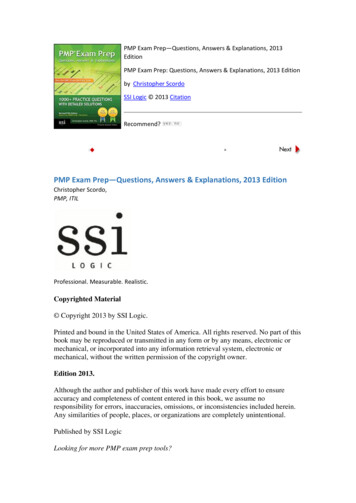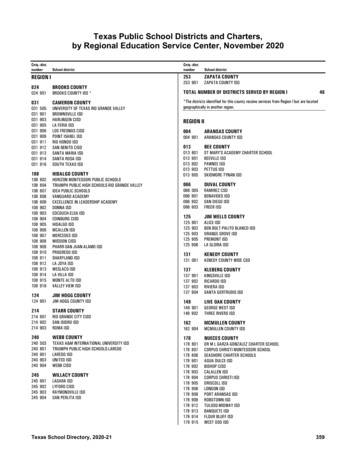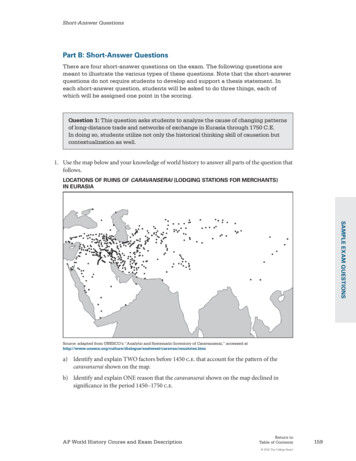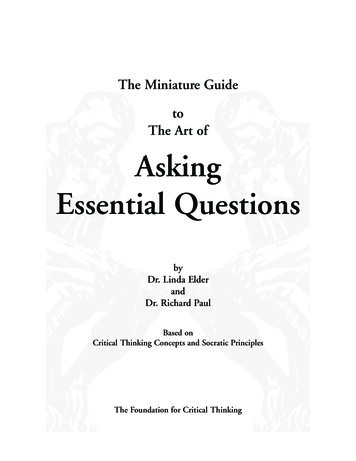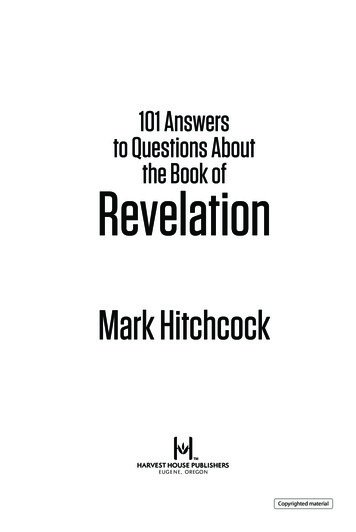
Transcription
Copyrighted material101 Answers to Questions About the Book of Revelation.indd 18/17/12 3:08 PM
Unless otherwise indicated, all Scripture quotations are taken from the New AmericanStandard Bible , 1960, 1962, 1963, 1968, 1971, 1972, 1973, 1975, 1977, 1995 by The LockmanFoundation. Used by permission. (www.Lockman.org) Verses marked TLB are taken from The Living Bible, Copyright 1971. Used by permission ofTyndale House Publishers, Inc., Wheaton, IL 60189 USA. All rights reserved.Cover by Left Coast Design, Portland, OregonCover photos Netfalls - Remy Musser, stavklem / ShutterstockPublished in association with William K. Jensen Literary Agency,119 Bampton Court, Eugene, Oregon 97404.101 ANSWERS TO QUESTIONS ABOUT THE BOOK OF REVELATIONCopyright 2012 by Mark HitchcockPublished by Harvest House PublishersEugene, Oregon 97402www.harvesthousepublishers.comLibrary of Congress Cataloging-in-Publication DataHitchcock, Mark, 1959101 answers to questions about the book of Revelation / Mark Hitchcock.p. cm.ISBN 978-0-7369-4975-0 (pbk.)ISBN 978-0-7369-4976-7 (eBook)1. Bible. N.T. Revelation—Criticism, interpretation, etc.—Miscellanea. I. Title.BS2825.52.H575 2012228'.06—dc232012010773All rights reserved. No part of this publication may be reproduced, stored in a retrieval system, ortransmitted in any form or by any means—electronic, mechanical, digital, photocopy, recording, orany other—except for brief quotations in printed reviews, without the prior permission of the publisher.Printed in the United States of America12 13 14 15 16 17 18 19 20 / LB-CD / 10 9 8 7 6 5 4 3 2 1Copyrighted material101 Answers to Questions About the Book of Revelation.indd 28/17/12 3:08 PM
To Jerry and Sherry RobertsThank you for your faithful friendship and love forour Lord and my family. You and your family are ablessing beyond description to us and so many others.Copyrighted material101 Answers to Questions About the Book of Revelation.indd 38/16/12 2:45 PM
Copyrighted material101 Answers to Questions About the Book of Revelation.indd 48/16/12 2:45 PM
ContentsPreface . . . . . . . . . . . . . . . . . . . . . . . . . . . . . . . . . . . . . . . . .13Part One—The Interpretation of RevelationWhy study the book of Revelation? Why is it important? . . .17What are the four main views of Revelation? . . . . . . . . . . . .19What are some of the keys to interpreting Revelation,especially all the symbols? . . . . . . . . . . . . . . . . . . . . . . . . . . .25Are the numbers and time periods in Revelation literal? . . . .33What is the outline of the book? . . . . . . . . . . . . . . . . . . . . . .36Part Two—The Background of RevelationWho was the human author of Revelation? . . . . . . . . . . . . .41When was Revelation written? . . . . . . . . . . . . . . . . . . . . . . .42Who were the recipients of Revelation? . . . . . . . . . . . . . . . .51What is Revelation about? . . . . . . . . . . . . . . . . . . . . . . . . . .52What are some of the key words in Revelation? . . . . . . . . . .53Was Patmos a penal colony in the first century? . . . . . . . . . .55Part Three—The Revelation of Jesus Christ (Revelation 1)What does the title “the Revelation of Jesus Christ” mean? . .59What are the names and titles for Jesus in Revelation? . . . . .60What do “soon” and “near” mean in 1:1 and 1:3? . . . . . . . . . .61Who are the “seven Spirits of God”? . . . . . . . . . . . . . . . . . . .65How can every eye see Jesus when He returns to earth (1:7)? . .68Copyrighted material101 Answers to Questions About the Book of Revelation.indd 58/16/12 2:45 PM
What does “Almighty” mean (1:8)? . . . . . . . . . . . . . . . . . . . .69What does “in the Spirit” mean (1:10)? . . . . . . . . . . . . . . . . .70What is “the Lord’s day” (1:10)? . . . . . . . . . . . . . . . . . . . . . .70Who are the “angels” of the seven churches?Are they angelic beings or humans? . . . . . . . . . . . . . . . . . . .72Part Four—The Churches (Revelation 2–3)Why did Jesus address these seven churches? . . . . . . . . . . . .77Do the seven churches represent seven stagesof church history? . . . . . . . . . . . . . . . . . . . . . . . . . . . . . . . . .78Who were the Nicolaitans? . . . . . . . . . . . . . . . . . . . . . . . . . .82What does it mean to be an “overcomer”? . . . . . . . . . . . . . .84What are the “ten days” of tribulation (2:10)? . . . . . . . . . . . .85What is Satan’s throne (2:13)? . . . . . . . . . . . . . . . . . . . . . . .86What is the “white stone, and a new name writtenon the stone” (2:17)? . . . . . . . . . . . . . . . . . . . . . . . . . . . . . . .87Can the names of believers be erased fromthe book of life (3:5)? . . . . . . . . . . . . . . . . . . . . . . . . . . . . . .88Does Revelation 3:10 support the pretribulationrapture view? . . . . . . . . . . . . . . . . . . . . . . . . . . . . . . . . . . . .89Who are the “earth dwellers” in Revelation? . . . . . . . . . . . . .91What does it mean that Jesus is “the Beginning of theCreation of God” in 3:14? . . . . . . . . . . . . . . . . . . . . . . . . . .93What is meant by “hot,” “cold,” and “lukewarm” in 3:15-16? .95Is Revelation 3:20 a gospel invitation? . . . . . . . . . . . . . . . . .98Copyrighted material101 Answers to Questions About the Book of Revelation.indd 68/16/12 2:45 PM
Part Five—The Consummation (Revelation 4–22)Section One—The Scene in Heaven (4 –5)Is Revelation 4:1 a reference to the rapture? . . . . . . . . . . . . .107Will believers see God in heaven? . . . . . . . . . . . . . . . . . . . . .109Who are the 24 elders? . . . . . . . . . . . . . . . . . . . . . . . . . . . . .112What is the seven-sealed scroll in Revelation 5? . . . . . . . . . .114Section Two—The Tribulation (6–18)Why do the scenes in Revelation alternate back andforth between heaven and earth? . . . . . . . . . . . . . . . . . . . . .119Who is the rider on the white horse in 6:1-2? . . . . . . . . . . . .121What are the “wild beasts” in 6:8 that killone-fourth of the earth? . . . . . . . . . . . . . . . . . . . . . . . . . . . .125What’s the relationship between the seven seals,seven trumpets, and seven bowls? . . . . . . . . . . . . . . . . . . . . .127Who are the 144,000 in 7:1-8? . . . . . . . . . . . . . . . . . . . . . . .129Why is the tribe of Dan omitted from the list of the 12 tribes ofIsrael in Revelation 7? . . . . . . . . . . . . . . . . . . . . . . . . . . . . . . 132Who is the great multitude in 7:9-17? . . . . . . . . . . . . . . . . .133Why is there silence in heaven for about 30 minutes (8:1)? . .134Are the trumpet judgments symbolic or literal? . . . . . . . . . .136Are the trumpet judgments the result of human actionsor divine judgment? . . . . . . . . . . . . . . . . . . . . . . . . . . . . . . .137Are the trumpets in the first or second half ofthe Tribulation? . . . . . . . . . . . . . . . . . . . . . . . . . . . . . . . . . .138What are the “locusts” in 9:1-12? . . . . . . . . . . . . . . . . . . . . .139Copyrighted material
What is the army of 200 million in 9:16? . . . . . . . . . . . . . . . 145Who is the strong angel in chapter 10?Is this a reference to Jesus? . . . . . . . . . . . . . . . . . . . . . . . . . . 147What is the “little book” in 10:2? . . . . . . . . . . . . . . . . . . . . . 149What are the “seven peals of thunder” in 10:3-4? . . . . . . . . . 149What does it mean for John to eat the book (10:9-10)? . . . . . 150What is the temple in Revelation 11:1-2? . . . . . . . . . . . . . . . . 151Who are the two witnesses? . . . . . . . . . . . . . . . . . . . . . . . . . 153What will the two witnesses do? . . . . . . . . . . . . . . . . . . . . . . 158Do the two witnesses minister during the firstor second half of the Tribulation? . . . . . . . . . . . . . . . . . . . . . 159Is the seventh trumpet in 11:15 the same as the “last trumpet”in 1 Corinthians 15:52? . . . . . . . . . . . . . . . . . . . . . . . . . . . . . 160Who is the woman clothed with the sun in chapter 12? . . . . 161Who are the dragon and the “third of the stars of heaven”in chapter 12? . . . . . . . . . . . . . . . . . . . . . . . . . . . . . . . . . . . . 163What are the “two wings of the great eagle” given tothe woman (12:14)? . . . . . . . . . . . . . . . . . . . . . . . . . . . . . . . 163Is the beast of Revelation 13:1-10 an empire or an individual? . 164Is the beast past or future? Could he be Nero? . . . . . . . . . . . 165Will the beast be assassinated and come back to life? . . . . . . 167Will the Antichrist be a Jew or a Gentile? . . . . . . . . . . . . . . . 170What will the beast in 13:1-10 do? . . . . . . . . . . . . . . . . . . . . . 171Who is the second beast or “beast coming up outof the earth” in 13:11-18? . . . . . . . . . . . . . . . . . . . . . . . . . . . . 172Will the second beast be a Jew or a Gentile? . . . . . . . . . . . . . 174Copyrighted material101 Answers to Questions About the Book of Revelation.indd 88/16/12 2:45 PM
What is the mark of the beast (666)? . . . . . . . . . . . . . . . . . . 174Is the scene in 14:1-5 in heaven or on earth? . . . . . . . . . . . . . 176What is the “eternal gospel” in 14:6? . . . . . . . . . . . . . . . . . . . 177Will hell really last for eternity (14:10-11)? . . . . . . . . . . . . . . . 178Will blood literally flow as high as the horses’ bridlesat Armageddon (14:19-20)? . . . . . . . . . . . . . . . . . . . . . . . . . 181Are the judgments in Revelation 14:14-16and 14:17-20 the same? . . . . . . . . . . . . . . . . . . . . . . . . . . . . . 183What is the song of Moses in 15:1-3? . . . . . . . . . . . . . . . . . . 183What does Armageddon mean? Is it a real place (16:12)? . . . . 184What will happen during Armageddon? . . . . . . . . . . . . . . . 185Who are the kings of the east (16:12)? . . . . . . . . . . . . . . . . . 185Why will the kings of the earth gather at Armageddon? . . . . 186What is Babylon in Revelation 17–18? . . . . . . . . . . . . . . . . . 188What do the seven heads (seven kings) in 17:9 represent? . . . 195Section Three—The Second Coming of Christ (19)What and when is the marriage and marriage supperof the Lamb? . . . . . . . . . . . . . . . . . . . . . . . . . . . . . . . . . . . . 205When Jesus comes, will He really ride on a white horse? . . . . 206Is the rapture the same event as the second coming? . . . . . . . 208Section Four—The Millennium, Final Revolt, and Great WhiteThrone (20)What is the millennium? . . . . . . . . . . . . . . . . . . . . . . . . . . . 213What are the different views of the millennium? . . . . . . . . . 213Copyrighted material101 Answers to Questions About the Book of Revelation.indd 98/16/12 2:45 PM
Which view of the millennium best representsscriptural teaching? . . . . . . . . . . . . . . . . . . . . . . . . . . . . . . . 216What is meant by “came to life” and “the first resurrection”in 20:4-6? . . . . . . . . . . . . . . . . . . . . . . . . . . . . . . . . . . . . . . 220Where will believers be during the millennium, andwhat will they do? . . . . . . . . . . . . . . . . . . . . . . . . . . . . . . . . 221Who is “Gog and Magog” in 20:8? . . . . . . . . . . . . . . . . . . . 223Why will God release Satan at the end of the 1000 years? . . . 225What is the Great White Throne Judgment in 20:11-15? . . . . 227Section Five—The New Heaven, New Earth, and New Jerusalem(21–22)Will this present heaven and earth be destroyed,or just renovated? . . . . . . . . . . . . . . . . . . . . . . . . . . . . . . . . . 231What’s the relationship between the new heaven and new earthand the New Jerusalem? . . . . . . . . . . . . . . . . . . . . . . . . . . . . 233What is the size and shape of the New Jerusalem? . . . . . . . . 234What is meant by “the kings of the earth will bring their glory”into the heavenly city (21:24-26)? . . . . . . . . . . . . . . . . . . . . . 235Will people in heaven need to be healed (22:2)? . . . . . . . . . . 237Are the gold, gems, and measurements of heavenliteral or symbolic? . . . . . . . . . . . . . . . . . . . . . . . . . . . . . . . . 238What does the warning about adding to or taking awayfrom Revelation mean (22:18-20)? . . . . . . . . . . . . . . . . . . . . 239How can I be sure that I’m going to heaven? . . . . . . . . . . . . 241Recommended Further Reading on Revelation . . . . . . . . . . 243Notes . . . . . . . . . . . . . . . . . . . . . . . . . . . . . . . . . . . . . . . . . 245Copyrighted material101 Answers to Questions About the Book of Revelation.indd 108/16/12 2:45 PM
We are living in the strangest days that man has everknown. The world has passed through terrible timesbefore, but never has the whole earth been so boundtogether in its wild plunging through one catastrophe after another as today. There have been wars downthrough the ages, but never wars that have touched somany nations as the conflicts through which we havepassed in this generation. There have been political crises, but not on a scale that touched all of the continents.Civilization has brought so many new means of communication that the matters which affect one nation affectall. Events that take place in Europe and Asia becomenews that vitally concerns the farmer in the MississippiValley. Thoughtful Bible students agree almost universally that we are living near the end of the age, and thatat any moment the outline of prophetic events preservedfor us in Scripture will begin its course of fulfillment. Theworld will then rush rapidly through all of the scenes ofhistory which God has written in advance.The book of Revelation is the book for the present hour. 1Donald Grey BarnhouseCopyrighted material101 Answers to Questions About the Book of Revelation.indd 118/16/12 2:45 PM
Generally speaking there are two extreme attitudestoward Revelation. Some say the book cannot be understood, and therefore should not be studied, taught orpreached. Differences of interpretation, they point out,have divided Christians, and therefore the book shouldnot be interpreted. Others consider themselves so sureof every detail of the book that they set dates and propose highly fanciful interpretations. To them Revelationseems the only book in the Bible worth studying Letour approach be neither theoretical and detached butalways personal and involved God can motivate believers today by the understanding of those things which Hehas revealed through John in Revelation. 2Charles C. RyrieCopyrighted material101 Answers to Questions About the Book of Revelation.indd 128/16/12 2:45 PM
PrefaceWHere are We todaY? HoW much longer do we have? Whaton earth is happening? Where are we on God’s prophetic calendar? Whatever one’s background or beliefs, these are the questions on the minds of people everywhere today.The book of Revelation is the capstone of God’s Word toman. It tells us where this world is headed. It answers the greatquestions we all have about the future. Yet for many it remainsa closed book. Sadly, its panorama of prophecy is a sealed mystery for most Christians.There are many excellent commentaries and studies on Revelation, but many people find them too intimidating, too indepth, or too irrelevant.Given what is happening in the world today, it has never beenmore important for people to understand Revelation. Yet at thesame time, many don’t seem to know where to begin. I thoughtit would be helpful to put together a book that answers thekey questions about Revelation in an accessible, user-friendlyformat. When this idea was presented to the folks at HarvestHouse, they enthusiastically agreed that this format would offer13Copyrighted material101 Answers to Questions About the Book of Revelation.indd 138/16/12 2:45 PM
14101 Answers to Questions About the Book of Revelationa fresh, unique contribution alongside the many fine commentaries that are available on Revelation.At Faith Bible Church in Edmond, Oklahoma, where Iserve as pastor, we took a full year to complete a verse-by-versestudy of Revelation. As an adjunct professor at Dallas Theological Seminary in the Department of Bible Exposition, I’ve hadthe privilege on several occasions to teach through Revelation.Even after having done these studies, I don’t claim to have allthe answers about the book of Revelation. But I do believe I’vebecome familiar with the kinds of questions people are asking.I’ve compiled 101 of those questions in this book, and my hopeis that this resource will help you understand Revelation better,and that it will also deepen your love for God’s Word and ourLord, who is the subject of Revelation.In this book I have two goals: (1) to answer key questionsabout Revelation in a clear, concise manner, and (2) to motivateus to live as God would want us to in light of what is to comein the days ahead.Copyrighted material101 Answers to Questions About the Book of Revelation.indd 148/16/12 2:45 PM
PART ONEThe Interpretationof RevelationCopyrighted material101 Answers to Questions About the Book of Revelation.indd 158/16/12 2:45 PM
Copyrighted material101 Answers to Questions About the Book of Revelation.indd 168/16/12 2:45 PM
Why study the book of Revelation?Why is it important?RevelatIon Is an IMPortant book to study if for no other reason than it is the capstone of God’s self-revelation to man. Revelation is the book of consummation. It tells us the ending of thestory that began in Genesis 1. The greatest value of Revelation iswhat it teaches us about the future. It discloses that this world isheaded for a devastating seven-year period of divine judgment;the rise of a final world ruler; a global government, economy,and worship; the great war of Armageddon; the second comingof Christ; the 1000-year reign of Christ on earth; the final judgment; and the new heaven and new earth. Revelation tells uswhere this world is headed, and where we are headed.Revelation is also important because it reveals and reaffirmsmany of the great doctrines of Scripture. Revelation is theologically rich. It displays the sovereignty and holiness of God. Itteaches us that God is in control, that He has a plan that He isbringing to fulfillment. It reveals that God alone can foretell thefuture and that He does so with 100 percent accuracy.The Christology (doctrine of Christ) is glorious in Revelation. Jesus is the Lamb (28 times) who was slain, yet is alive forevermore. He is God (Revelation 1:17; see also Isaiah 44:6). Heis worshipped as God (Revelation 5:13). He is the focus of all17Copyrighted material101 Answers to Questions About the Book of Revelation.indd 178/16/12 2:45 PM
18101 Answers to Questions About the Book of Revelationhistory and prophecy (19:10). Salvation comes through Christalone by faith alone in His death on the cross (1:5). Only Hisblood can wash away our sins (5:9; 7:14). He is the Lion ofJudah who is coming again as King of kings and Lord of lords(19:16).Revelation unveils the total depravity of man, who deservesjudgment, and shows man’s desperate need for the grace of God.Nowhere in Scripture do we see a more awful picture of man’sdepravity, rebellion, and blasphemy. The book of Revelationprovides a divine view of history. We see that no human empirecan endure. Man’s day will come to a tragic end.In the 404 verses in Revelation, there are about 278 allusionsto the Old Testament. Revelation is saturated with the Old Testament. John believes the Old Testament Scripture is the Wordof God, and he claims that his own message is divinely inspiredand authoritative (1:2).Revelation has a great deal to say about angels and demons.In fact, it talks about angels more than any other Bible book.Angels are active throughout the chapters, especially in bringing God’s wrath to the earth. The reality and evil of Satan andhis demonic host is also evident. Satan accuses and persecutesGod’s people, hates the Jews and tries to destroy them, empowers the Antichrist and the false prophet, and finally, is doomedto the lake of fire.One final reason to study Revelation is that it’s the only bookof the Bible that contains a special blessing for those who read itand keep the things written in it (Revelation 1:3). For this reason Revelation has been aptly called “the Blessing Book.” I praythat the Lord’s rich hand of blessing will rest upon you as westudy this book together and strive to understand and apply itstruths to our lives.Copyrighted material101 Answers to Questions About the Book of Revelation.indd 188/16/12 2:45 PM
part ONE—The Interpretation of Revelation19What are the four main views of Revelation?The vivid imagery and striking symbolism in Revelationhave led to very different views on how it should be interpretedand what time period it describes. Broadly speaking, there arefive main ways that people approach the book of Revelationrelated to how and when its prophecies are fulfilled: past, present, future, timeless, and a mixture of the previous four.1. Preterist View (Past)This view holds that Revelation is primarily a prophecy ofevents surrounding the destruction of Jerusalem in AD 70.There are two main branches of preterism: partial (moderate)and full (extreme or radical). R.C. Sproul, a partial preterist,defines the preterist approach: “An eschatological viewpointthat places many or all eschatological events in the past, especially during the destruction of Jerusalem in AD 70.” 3Preterists believe that Christ returned in AD 70 during thedestruction of Jerusalem by the Romans. Sproul says, “Preterists argue not only that the kingdom is a present reality, butalso that in a real historical event the parousia [Christ’s coming]has already occurred.” 4 They believe that Nero was the beastof Revelation 13; that the seal, trumpet, and bowl judgmentswere judgments on unfaithful Israel; that Babylon in Revelation17–18 was Jerusalem; and that Revelation 19 describes the coming of Jesus in AD 70 to destroy Jerusalem.The primary distinction between partial and full preteristsis that partial preterists, while maintaining that most of Revelation was fulfilled in the past, still believe in a future secondcoming of Christ. Full preterits believe that all prophecies—including those pertaining to the second coming and the resurrection of believers—are past events. They view the resurrectionCopyrighted material101 Answers to Questions About the Book of Revelation.indd 198/16/12 2:45 PM
20101 Answers to Questions About the Book of Revelationas spiritual. According to this view, we are beyond the millennium and are presently in the new heaven and new earth. Fullpreterists don’t know if there is an end to history. By rejectingorthodox biblical truths about the second coming of Christ, thebodily resurrection, and the final judgment, full preterists areoutside the pale of orthodox Christianity.When preterists defend their viewpoint, they lean heavily onthe “timing” statements in Revelation, such as “soon” (1:1) and“at hand” (1:3). They argue that these words demand the fulfillment of the prophecies in Revelation soon after the book waswritten. They date the writing of Revelation as having takenplace around AD 65.While there are many problems with preterism, two stand outas particularly indefensible. First, when proponents of this viewtry to relate and limit the global, catastrophic events describedin Revelation to the period leading up to the fall of Jerusalem,they are unable to stay consistently literal in their interpretationof the scriptural text. As they work their way through Revelation, they frequently shift back and forth between spiritualizingand allegorizing the text or taking it literally. When the text ofGod’s Word doesn’t fit what actually took place in AD 70, theyabandon literal interpretation.Second, as will be discussed in Part 2 of this book, there isstrong evidence that Revelation was written in AD 95 by John;therefore, it cannot be a prophecy about events that occurred 25years earlier in Jerusalem. If it’s true that Revelation was writtenin AD 95, then that serves as a death blow to the preterist view.2. Historicist View (Present)This view, which began with Joachim of Fiore in the twelfthcentury, interprets Revelation as a panorama or overview ofCopyrighted material101 Answers to Questions About the Book of Revelation.indd 208/16/12 2:45 PM
part ONE—The Interpretation of Revelation21the entire church age. This view was very common among theReformers at the time of the Protestant Reformation. It was heldby John Wycliffe, John Knox, William Tyndale, Martin Luther,John Calvin, Sir Isaac Newton, George Whitefield, CharlesSpurgeon, and Matthew Henry. However, very few hold thisview today. The key problem with historicism is that there islittle agreement on what the symbols in Revelation refer to andthus what the book means.3. Idealist View (Timeless)Idealism, also known sometimes as the spiritual approach,does “not look for individual or specific fulfillments of theprophecies of Revelation in the natural sense,” but believes “onlythat spiritual lessons and principles (which may find recurrentexpression in history) are depicted symbolically in the visions.” 5For idealists, the symbols in Revelation picture the ever-presentstruggle between good and evil and teach ideal, timeless principles to inspire believers as they endure the setbacks and suffering of life.According to this view, the great themes of the triumph of good over evil, of Christ over Satan, of thevindication of the martyrs and the sovereignty of Godare played out throughout Revelation without necessary reference to single historical events. The battlesin Revelation may be seen as referring to spiritual warfare, to the persecution of Christians, or to natural warfare in general throughout history. The beast from thesea may be identified as the satanically inspired political opposition to the church in any age, and the beastfrom the land as the opposition of pagan or corrupt religion to Christianity. The Harlot represents either thecompromise church or the seduction of the world inCopyrighted material101 Answers to Questions About the Book of Revelation.indd 218/16/12 2:45 PM
22101 Answers to Questions About the Book of Revelationgeneral. Each broken seal or sounded trumpet depictssome reality (famine, war, natural disaster) which happens in history on a recurring basis as part of the sovereign outworking of God’s purpose in history. 6Idealism grew out of the allegorical method of interpretingScripture, upheld by Origen and Clement, and gained tractionthrough the amillennial view held by Augustine. This is probably the predominant view today among scholars.The main appeal of idealism seems to be the desire of its proponents to relate the message of the book to readers in everyperiod of history. However, this aspiration is offset by idealism’sinability to give concrete meaning to the symbols of the book.This is a serious shortcoming. The book of Revelation is filledwith symbols, yet these symbols refer to things that are literal.They have literal referents (see, for example, the explanationthat appears in Revelation 1:20). The idealist view has no interpretive anchor that helps hold Revelation together. This view isextremely reader-centered and not tied to the original meaningof the text. Meaning becomes a moving target. Moreover, if thepurpose of Revelation is to teach timeless principles by the useof symbols, then what timeless principles are we to draw fromthis book, and are they really relevant? Idealism is not a reliableguide to the meaning of Revelation.4. Futurist View (Future)Futurists interpret Revelation 4 –22 as describing real peopleand events yet to appear on the world scene. Many of the luminaries in the early church adopted a futurist view: Justin Martyr, Irenaeus, Hippolytus, and Victorinus. Some contemporaryfuturists are John Walvoord, John MacArthur, Charles Ryrie,Tim LaHaye, J. Dwight Pentecost, and Thomas Ice.Copyrighted material101 Answers to Questions About the Book of Revelation.indd 228/16/12 2:45 PM
part ONE—The Interpretation of Revelation23One main objection to the futurist view is that “it removesRevelation from its original setting so that the book has little meaning for the original audience.” 7 After all, some wouldargue, how can Revelation have been relevant to the originalreaders if the events described in it wouldn’t take place untilmore than 2000 years in the future?There are two answers to this objection. First, one couldmake the same argument about hundreds of Old Testamentprophecies. For instance, Isaiah’s prophecies about the comingMessiah, such as the virgin birth in 7:14, were written 700 yearsbefore His birth. Micah’s prophecy about the birthplace of theMessiah in Bethlehem (in Micah 5:2) was also written about700 years before His coming. Many of Daniel’s predictionsweren’t fulfilled for centuries, and some of Daniel’s prophecies,written over 2500 years ago, have still not been fulfilled today.All these Old Testament prophecies were relevant at the timethey were given because the readers did not know when theywould be fulfilled. Likewise, the believers in Asia Minor whofirst received the book of Revelation didn’t know these eventswouldn’t be fulfilled for over 2000 years. They believed theprophecies could very well take place in their lifetime. And eachsubsequent generation that has read and studied Revelation haslived with the hope that the prophecies within it could be fulfilled in their generation. Not knowing when these events willcome to pass makes them relevant for every generation.Second, knowing how history will end, whether it is inour lifetime or not, gives great comfort and hope. Revelationteaches us that God
have divided Christians, and therefore the book should not be interpreted. Others consider themselves so sure of every detail of the book that they set dates and pro-pose highly fanciful interpretations. To them Revelation seems the only book in the Bible worth studying
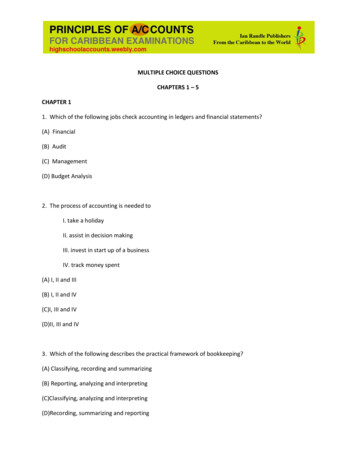
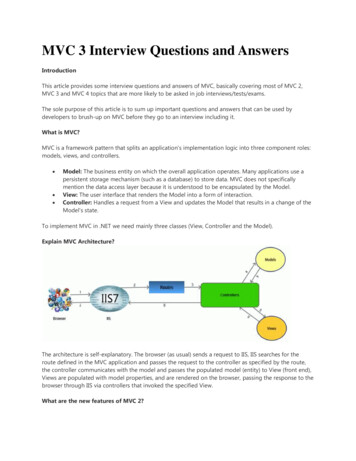


![Informatica Interview Questions and Answers [Scenario-Based]](/img/2/informatica-interview-questions-and-answers-scenario-based-1.jpg)
